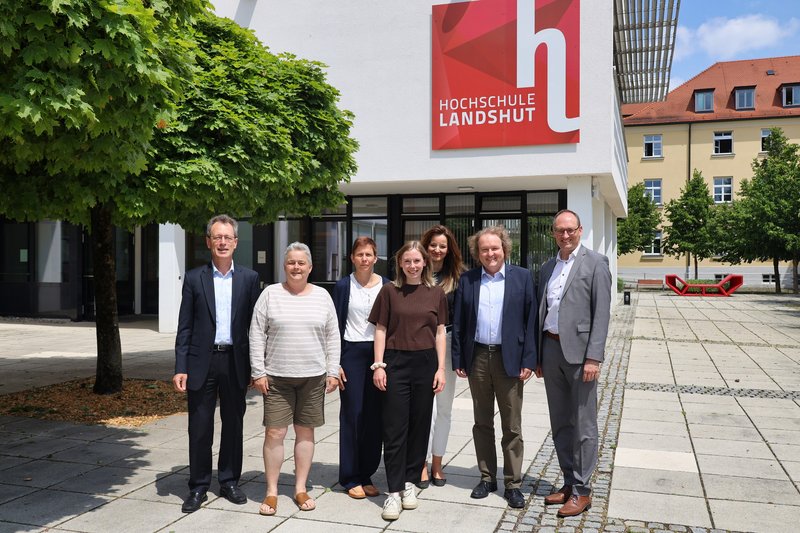The shortage of healthcare workers is visible and tangible. One component of the solution is a range of training programs close to home. This is growing for several professions at Landshut University of Applied Sciences, as Bernhard Seidenath, Chairman of the Health Committee in the Bavarian State Parliament, learned during his visit to the university.
The chairman had been invited by Helmut Radlmeier (CSU), member of the Landshut state parliament. With university president Professor Dr. Fritz Pörnbacher, the chief of the course of studies Physician Assistant (physician assistance) Professor Dr. Aida Anetsberger, the chief of the course of studies midwife primary qualifying Professor Dr. Judith Kluck, the teacher for special tasks midwifery Kick van Walbeek and Verena Weindl, which cares for the simulation laboratory of the courses of studies, spoke the delegates about the current situation of the courses of studies.
The first of the three study programs to start in 2020 is the further qualification of already certified midwives. Through the study program, the old-law trained midwives acquire a bachelor's degree in order to be able to pursue, for example, an academic career or even a teaching position. Furthermore, they acquire the qualification for practical guidance in order to be able to accompany the practical training of the students. Helmut Radlmeier personally persuaded Bavaria's Minister President Markus Söder to allow this course of study to be implemented at the Landshut site.
Gap closed in Lower Bavaria
In the upcoming winter semester, the primary qualifying course of study will begin. This will make it possible for the first time in all of Lower Bavaria to study the profession of midwifery on a dual basis. Accordingly, the interest in the course of studies is great, as Judith Kluck and Kick van Waalbek informed: more than 160 applications have been received so far. However, far fewer will be accepted. This is because every student must have a practical placement in a clinic that cooperates with the university, where the practical training takes place. However, as has become clear, there is a shortage of precisely such places.
A well-known problem, as Bernhard Seidenath explained. Bavaria-wide, the number of university training places for midwives has been increased to 220 - and thus more than doubled compared to the old training. The bottleneck remains the low number of practice places. Fortunately, questions of financing and training have already been resolved.
Judging by Judith Kluck, the lack of academically qualified teachers is still a major challenge. Accordingly, it is currently difficult to fill professorships for midwifery courses with suitably qualified midwives at all university locations. Kluck also addressed the need to establish a master's degree program for midwives.
New profession, new opportunities
While midwifery is a long-established profession, physician assistant (PA) is still a young occupational field, at least in Germany. Physician assistants support physicians by taking over certain tasks from them. Thanks to their studies, they are versatile, whether working on patients or in an organization. Helmut Radlmeier had supported the university's efforts to set up this course of study: "Physician assistants are an opportunity, especially for rural areas, where traditional family doctors are becoming fewer and farther between for patients," said Radlmeier, a member of the Bavarian State Parliament's Health Committee.
University President Fritz Pörnbacher is also convinced of this: "On the academic side, everything has been clarified for the job description. In practice, it is just being found. The experience is growing and is very good. The feedback from those who employ the physician assistants trained by us is more than satisfied".
So it's a profession with a future - and the study places in Landshut are in corresponding demand. "We can offer 30 places, we have 300 applications. Teaching in the medical subjects in Landshut is done exclusively by specialists in the field," reported study program director Aida Anetsberger, a specialist in anesthesiology, intensive care medicine and emergency medicine. "The numbers show it for all three programs: training close to home is attractive. In turn, every graduate helps the healthcare system - and thus the population in the Landshut region," Radlmeier concluded.
Photo: Landshut University of Applied Sciences
(Free to use if source is acknowledged)

